- Home
- Tim Powers
Three Days to Never: A Novel Page 11
Three Days to Never: A Novel Read online
Page 11
Malk and Bozzaris sat at adjoining sides of the square table, more or less between the Marritys and everyone else. Malk was mentally rehearsing the old training on how to throw himself backward in his chair and shoot under the table.
When he had sat down, he pulled his Chap Stick out of his pocket and nervously twisted off the cap; then, reflecting that it was probably bad manners to use it in a restaurant, he snapped the cap back on. He looked more closely at it.
“Shit,” he said absently to Bozzaris, “this isn’t Chap Stick—it’s…‘Nose Soother’! There’s a picture of a red nose on it. I’ve been putting it on my mouth!”
“Oh boy,” said Bozzaris. “They test those things in the factory, you know. Guys that test ’em, they can’t get any other jobs.”
“Shut up,” said Malk, shoving the tube back into his pocket.
“Some big old retard had that up his nose.” Bozzaris looked at his watch and then toward the door, as if they were expecting a third person, and then he looked around at the tables and booths. “Bailey did say one o’clock, didn’t he?”
“That’s what the message on my machine said,” Malk agreed, looking around himself. Waiting impatiently for an imaginary third person was a good excuse to check out the surrounding people; he memorized the other diners—a man and a woman in the booth south of the Marritys, three older women toward the north end, and three college-looking boys in T-shirts against the inner wall, under a shelf full of pasta boxes and Italian cookie cans. At least one party, he told himself, must be operatives of the other force, whatever it is, and they’ll be speculatively noting Bozzaris and me. At least we’re talking spontaneously, what with the Nose Soother and all.
“What are you going to have?” Malk asked.
“I don’t know. A beer, a sandwich.”
Because he was listening for it, Malk could hear Bozzaris suppressing his Israeli accent, pronouncing the r at the front of his mouth and flattening the emphases; somehow the cadence of American English wasn’t as sociable as the Israeli cadence.
“Me too, I guess,” said Malk.
“I’m gonna hit the head first,” said Bozzaris, pushing his chair back. “A Budweiser, if the lady comes by.”
Malk nodded, and when Bozzaris strode away he took a ball point pen from his pocket and began doodling on the paper place mat so that he could keep his eyes in an unfocused stare that took in the periphery—absently he drew a dog wearing a bowler hat and a snail with a mustache and pince-nez glasses.
“No,” Marrity was saying six feet away, “I imagine the funeral will be down here. I guess Bennett and Moira will arrange to have the body flown down from Shasta. I should have called them this morning.”
Malk noted that Marrity was apparently not aware of any need for secrecy. As he’d told Bozzaris last night, Marrity didn’t seem to know anything about his grandmother’s history.
From the corner of his eye, he saw the girl nod.
Bozzaris came back and sat down. “You should go to the head too,” he said, very quietly. “Check out an old party sitting in the last booth by the east wall.”
Malk nodded, guessing that he meant the old man who had visited the Marritys five hours ago. What the hell did that mean? “Bailey can do it or not,” he said in a normal tone, “doesn’t matter to us.” He pushed back his chair.
“Daph?” said Marrity urgently, and Malk looked over at them.
The girl was holding her throat with one hand, and her face was blank.
“Daph, can you talk?”
She shook her head, her eyes showing alarm now; and Marrity slid out of the booth and stood up, pulling her to her feet. He grabbed her by the shoulders and turned her around, then he crouched and linked his fists over her abdomen from behind.
“Relax, Daph,” he said. “Heimlich.”
He jerked his fists back and up, ramming the inner one into her stomach just below the ribs; her hands gripped her thighs, but apparently no food was dislodged.
“Hang on,” Marrity said hoarsely, “one more time, harder.” Again he drove his fist upward into her abdomen, but again there was no result.
Malk had tensed, and his hands were tingling, but he was sure he couldn’t do any better than the girl’s father was.
“Somebody call 911,” Marrity shouted, and then yanked his fist powerfully into Daphne one more time. His shirt was already dark with sweat.
A gray-haired man in a green Members Only jacket had shuffled in from the other dining room, and now stood by Malk’s table, looking on in evident horror; and he was indeed the man who had driven the green Rambler and spoken to Marrity this morning.
Malk looked back at the girl and her father, and gripped the edge of his table. He realized that he was praying.
The couple in the booth behind Marrity had got to their feet, but were only staring at the man holding the girl, and the three old women had all put down their forks and were blinking in evident confusion. Malk’s training overrode his horrified fascination, and it occurred to him that this conspicuous emergency would probably wreck any kidnap plans.
Daphne opened her mouth and Malk could see her abdomen tighten as she tried uselessly to expel the blockage.
One of the college boys had a cellular phone out, and the cashier was anxiously looking their way and speaking into a telephone at the counter.
“And another, Daph,” said Marrity in a voice that was nearly a sob. This time her knees folded after the forceful upward thrust, and Marrity sat down hard on the linoleum, holding her in his lap now.
He looked up desperately, and clearly noticed the old man in the green jacket. Marrity opened his mouth as if to say something to him, then just closed his eyes and jerked his fists up again. Malk heard the girl’s teeth snap shut as the thrust rocked her head back.
Four minutes until brain damage, Malk thought. How quickly can the paramedics get here?
He noted that everyone in the restaurant seemed to have crowded in the doorway to watch. A distraction not to be wasted, he thought. Choose your moment.
Marrity could only think of how humiliated Daphne must be by this public spectacle. He would not permit himself to imagine that she might die here.
He loosened his cramped hands and reached forward to roll her head back; she was unconscious now, her face white, her lips and half-closed eyelids shadowed with a bluish tint. Of course she was not breathing.
The Heimlich maneuver was not working, would not work; it dawned on him finally that very soon he would be uselessly pummeling a limp corpse. “Dammit, Daphne,” he whispered, “why couldn’t you chew?”
He looked up at his father. The old man was nodding in evident sympathy.
Marrity lifted Daphne’s limp body off his lap and laid her face-up on the black-and-red linoleum.
“A sharp knife,” he said, holding out his right hand. “Quick!”
The older of the two men who had been at the nearest table flicked open a flat stainless-steel pocketknife and slapped the grip into Marrity’s hand.
Marrity’s father stepped forward. “No, Frank!” he shouted. “You’ll kill her! Somebody stop him!”
The man who had given Marrity the knife stood up and threw an arm across the old man’s chest, and one of the college boys from the farther booth gripped his upper arm.
“It’s all he can do,” the boy said.
“Hold him,” said the man who had provided the knife, and then he pushed his way through the crowd in the doorway.
One of the old women in the north-wall booth shouted something in German, and was shushed by her companions; and peripherally Marrity was aware that his father was struggling very hard with the college boys, who were holding him back; but Marrity’s attention was fixed on Daphne.
He pushed her chin up and back, then felt her throat. The larynx muscles were convulsing weakly under his hand, and he felt for the rings of cartilage in her throat.
The younger man from the nearest table had crouched beside him and was holding something in Marrity’s field o
f vision—it was the clear barrel of a Bic pen, with the ink tube pulled out. Marrity nodded, sweat dripping from his face onto Daphne’s blouse.
His heart was pounding so hard that he was twitching with it.
Gripping the knife by the blade like a pencil so that only three-quarters of an inch of steel protruded below his thumb, Marrity pushed the point of it into Daphne’s throat below the thyroid cartilage, denting the skin and then, as he despairingly pushed harder, puncturing it.
A bloody spray followed the knife blade when he pulled it out, and he snatched the Bic pen barrel from the outstretched hand and pushed it into the makeshift incision.
Air whistled out through the clear plastic tube that now stood up out of Daphne’s throat like a dart, and Marrity held the tube in place with his trembling thumb and forefinger.
“Goddammit, stop him!” roared his father.
“Shut up, man,” said somebody else. “It’s working.”
Now air was being sucked into the tube, and a moment later Daphne’s legs shifted on the floor and her hands flexed.
The man crouched beside Marrity gave one bark of tense laughter. “You’ve saved her,” he said.
Daphne’s eyes fluttered open.
“Don’t move, Daph,” Marrity said, feeling the smile tugging at his face. “You’re fine, just lie still.” He sat down more comfortably next to her on the floor.
She managed a slight nod. Her hands floated up toward her throat, but Marrity pushed them back with his free hand. “Don’t move, kid, just lie still. Trust me.”
She nodded again, and even managed a flickering, uncertain smile, and relaxed. As Marrity watched, the healthy pink color was returning to her face like sunlight filling in shadow.
Marrity glanced at the man beside him; he looked to be in his late twenties, with a dark brush cut, and he needed a shave; he wore a gray linen sport coat with no tie.
“Th-thank you,” Marrity said. His hands were trembling and his ears were ringing. He leaned back carefully against a table leg.
“My pleasure,” the young man said. “Keep the pen.”
Marrity nodded, then tried with one hand to wipe the blade of the knife off on his shirt. The man gently took the knife from Marrity’s shaking hands.
“Give that back to your friend,” Marrity said.
“Right.”
Marrity looked up at his father, who was still gaping down at Daphne in dismay. “She’s breathing,” Marrity told him. He nodded toward the tube he was still holding in Daphne’s throat. “That’s a—a tracheotomy.”
“I know,” the old man said. “I’ve done one. The results were bad.” He blinked a couple of times. “I told you not to have Italian, didn’t I?”
“Yes.” I think he’s more upset by this than Daphne is, Marrity thought. “We should have listened to you.”
Three men in white paramedics’ uniforms shouldered through the front door and into the dining room now, one of them rolling a folded gurney and the other two carrying aluminum cases and a green oxygen cylinder; they visibly relaxed when they took in the scene, but one of them crouched by Daphne, murmuring reassurances as he shined a penlight into one of her eyes and then the other, while another man was unstringing an IV bag and line from one of the cases. The third man was talking into a radio.
The man who was crouched on the floor gently opened Daphne’s mouth and peered down her throat with his light, then shook his head. “They better get it out in ER.” He looked over at Marrity. “You okay?”
“Sure,” Marrity said. He took a deep breath and let it out. “Tired.”
“How long was she unconscious?”
“Not more than a minute,” Marrity said.
“How old is she?”
“Twelve.”
“Is she on any medications, or allergic to any?”
“No, and no.”
“Okay, we’ll get an IV going, mainly to get some glucose into her, and we’ll run her to St. Bernardine’s to get the blockage out and suture her throat. Probably they’ll keep her overnight, observation and antibiotics. But this looks good. Who did the tracheotomy?”
“I did,” said Marrity.
“You do good work.”
“That’s what they told me too,” muttered Marrity’s father.
“I think dinner’s off, tomorrow,” Marrity told him.
Standing on the shaded sidewalk outside the restaurant, old Derek Marrity watched the paramedics slide the folding stainless-steel gurney with Daphne on it into the back of their white-and-red van, and then Frank Marrity climbed in the back too. A moment later the doors had been slammed shut and the ambulance van had steered out into the sunlight and sped away down Base Line Street to the east, its lights flashing.
The old man was still dizzy, and his ears were still ringing. He had been staring at Frank Marrity’s haggard face so intently that now he could still see the afterimage of the straight jaw, the squinting eyes, the compressed mouth.
He looks just like you, Daphne had said.
“What was that you gave him, when he cut her throat?” said an overweight old woman standing behind him; he turned, but saw that she was speaking to the younger man who had been sitting at the table nearest Marrity’s booth. He had been with another man, who had disappeared while Daphne was choking.
“A Bic pen,” the man said, “with the ink cartridge taken out of it.”
“Not very sterile,” said Derek Marrity.
“Least of the worries, at that point,” the man said shortly. “He’s her father?”
“Yes.” Yes, Derek Marrity thought, he’s her father. I’m a stranger in this picture, soon to disappear. An ineffective, useless stranger, as it turns out.
The young man didn’t say anything, just kept looking at Derek Marrity; but Marrity wouldn’t fall for that old cop trick of prompting a fuller answer by appearing to expect it. This guy’s tipped his hand right here, the old man thought with nervous defiance; he and the guy he was with are from one of the secret outfits, the Mossad, the NSA, whoever, whoever. But what could I tell any of them now? I have no idea at all.
They’ll probably follow me. They’ve probably already bugged the Rambler, with some clunky “state-of-the-art” devices.
His smile was brief and twitchy as he imagined big metal boxes with lights on them, and antennae like sections of polished rebar. Man from U.N.C.L.E. stuff.
He found that he was limping rapidly east down the sunny Base Line Street sidewalk, past the grand yellow stucco arch of a car-repair garage and then a couple of faded bungalow-style houses looking shackled behind chain-link fencing and black iron window bars, and he couldn’t remember how he had left the young spy and the fat old woman. The Rambler was parked on a side street up ahead; he had stashed a fifth of vodka under the seat, and he would need a bit of its vitamin supplement before he considered what to do now, today having gone so badly wrong. Frank and Daphne must think I’m crazy now, he thought.
Soon to disappear, he thought again.
When he had stepped barefoot out of the Kaleidoscope Shed yesterday, a good hour before Frank and Daphne had arrived, he had seen naked infants lying among the tall weeds, their waving pink limbs stark against the black dirt and the green stalks; the dozen?—half dozen?—tiny wailing forms had flickered out of existence when he had blinked at them in astonishment.
Delirium tremens, he thought; still mild, really. But in fact we’re all just sparks arcing across the vacuum left by God when He withdrew, none of us any more substantial than those alcohol-conjured infants. What’s one wasted life?
He’s her father. Yes. Not me, damn my soul, not me. I had a daughter once, but she died. She will not come back to life. She will not, and I mustn’t imagine anymore that she could.
I have…another daughter. She’ll grow up, God help her, and God help me.
Through his mind flickered the quickly dismissed image of a dark-haired little girl frowning in concentration over a book; and then, just as quickly dismissed, another im
age: of a drunken woman resolutely climbing into the driver’s seat of a Ford LTD and slamming the door.
He turned right at the next street, his bad leg aching now, and he could see the green Rambler parked in the shade of a pepper tree at the curb ahead of him—but he saw it blurrily, through tears.
By the rivers of Babylon, he thought, I sat down, yea, weeping again the King my father’s wrack.
But he knew he was weeping for Daphne.
Bozzaris watched the old man hobble away, reflecting that he hadn’t seemed quite sane. But Lepidopt had sayanim to follow him; any of the people on the street now might be one of them.
He turned to the old woman. “You said something in German, inside. Are you German?”
The question seemed to nettle her. “My mother was German,” she said. “That was part of a prayer she used to say.”
Bozzaris was about to ask her what it meant, but her two companions came bustling and chattering out of the restaurant then, and a moment later a boxy white Dial-A-Ride bus pulled up at the curb, and when the doors had hissed open the three of them clambered aboard.
Bozzaris waved cheerfully at the bus’s opaque tinted glass, then turned to go back into the restaurant; but Malk stepped out onto the pavement and told him, “Lunch hour’s over. To hell with Bailey.”
“Right,” said Bozzaris, falling into step beside the older man as he walked around the west corner to the parking lot. They both squinted in the direct sunlight.
Quietly, Malk told him, “Grab the bag by the Dumpster outside the back door; you’ll probably have to jump a fence, but do it. I took the beer bottles from the old guy’s table, replaced them with a couple of bottles from another table. Fingerprints.”
“Got you.”
Paul Golze was driving the Dial-A-Ride bus, and Charlotte Sinclair was sitting on the corrugated rubber floor in the back.
“That guy met up with the one he was with before,” she said as the van speeded up, “and they’re walking out to the parking lot, talking—and I’m out of range.”
“Okay,” Golze said. “We’ll play the tapes soon,” he went on, scowling into the rearview mirror, “but Tina, why did you speak German?”

 Expiration Date
Expiration Date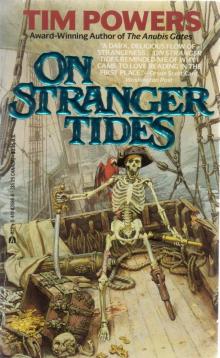 On Stranger Tides
On Stranger Tides Earthquake Weather
Earthquake Weather Forsake the Sky
Forsake the Sky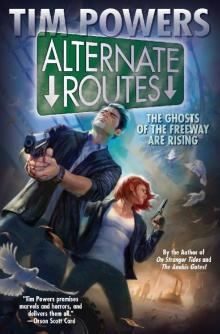 Alternate Routes
Alternate Routes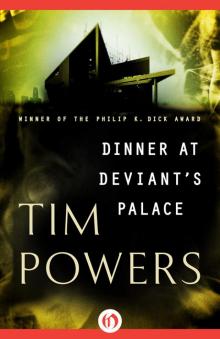 Dinner at Deviant's Palace
Dinner at Deviant's Palace The Stress of Her Regard
The Stress of Her Regard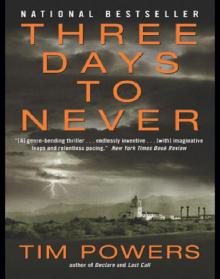 Three Days to Never: A Novel
Three Days to Never: A Novel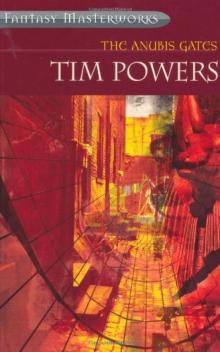 The Anubis Gates
The Anubis Gates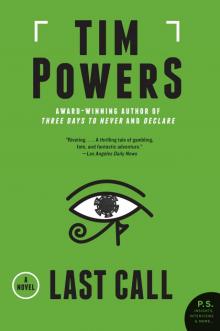 Last Call
Last Call Forced Perspectives
Forced Perspectives Strange Itineraries
Strange Itineraries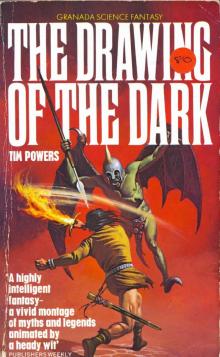 The Drawing of the Dark
The Drawing of the Dark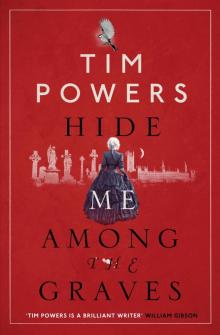 Hide Me Among the Graves
Hide Me Among the Graves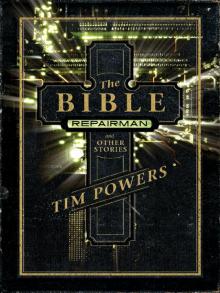 The Bible Repairman and Other Stories
The Bible Repairman and Other Stories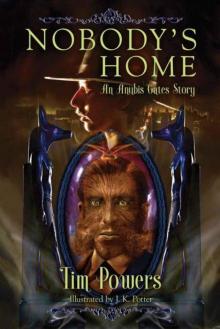 Nobody's Home: An Anubis Gates Story
Nobody's Home: An Anubis Gates Story More Walls Broken
More Walls Broken The Skies Discrowned
The Skies Discrowned Epitaph in Rust
Epitaph in Rust Skies Discrowned and An Epitaph in Rust
Skies Discrowned and An Epitaph in Rust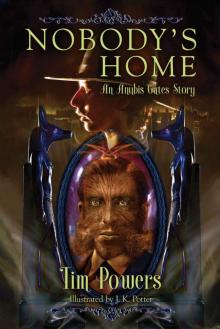 Nobody's Home
Nobody's Home Drawing of the Dark
Drawing of the Dark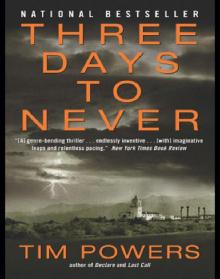 Three Days to Never
Three Days to Never